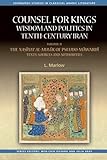Counsel for Kings : Wisdom and Politics in Tenth-Century Iran: Volume II: The Nasihat al-muluk of Pseudo-Mawardi: Texts, Sources and Authorities / L. Marlow.
Material type: TextSeries: Edinburgh Studies in Classical Arabic Literature : ESCALPublisher: Edinburgh : Edinburgh University Press, [2022]Copyright date: ©2016Description: 1 online resource (184 p.)Content type:
TextSeries: Edinburgh Studies in Classical Arabic Literature : ESCALPublisher: Edinburgh : Edinburgh University Press, [2022]Copyright date: ©2016Description: 1 online resource (184 p.)Content type: - 9780748696987
- 9780748696994
- 320.55/7 23
- online - DeGruyter
- Issued also in print.
| Item type | Current library | Call number | URL | Status | Notes | Barcode | |
|---|---|---|---|---|---|---|---|
 eBook
eBook
|
Biblioteca "Angelicum" Pont. Univ. S.Tommaso d'Aquino Nuvola online | online - DeGruyter (Browse shelf(Opens below)) | Online access | Not for loan (Accesso limitato) | Accesso per gli utenti autorizzati / Access for authorized users | (dgr)9780748696994 |
Frontmatter -- Contents -- Preface -- PART I THE CULTURAL LANDSCAPE -- 1 The Presentation of Counsel -- 2 Sources and Authorities: The Living Meaning of Ancient Wisdom -- PART II THE THREE GOVERNANCES: TRANSLATIONS AND COMMENTARY -- 3 The King's Self-governance -- 4 The Governance of the Élites -- 5 The Governance of the Common People -- Conclusion -- Notes -- Bibliography -- Index
restricted access online access with authorization star
http://purl.org/coar/access_right/c_16ec
A textual and contextual study of an early Arabic mirror for princes Mirrors for princes form a substantial and important genre in many pre-modern literatures. Their ostensible purpose is to advise the king; at the same time they assert that the king, if he is truly virtuous, will appreciate being reminded of the contingency of his power. The unknown author of the Counsel for Kings studied in this book wrote in a distinctive early tenth-century Iranian environment. He deploys an abundant set of cultural materials representing 'perennial wisdom' of mixed provenances, which he reinvigorates by applying them to the circumstances of his own time and place. The first volume situates Counsel for Kings in its historical context. The second volume gives direct access to a substantial portion of the text through translation and commentary.Key featuresIntegrates the evidence of Counsel for Kings with established materials for the study of Samanid historyDemonstrates the interplay of mirrors for princes with other forms of literary expression, such as anthologies of adab, historiographical, theological, philosophical and homiletic writings, encyclopaedic works and poetry
Issued also in print.
Mode of access: Internet via World Wide Web.
In English.
Description based on online resource; title from PDF title page (publisher's Web site, viewed 02. Mrz 2022)


